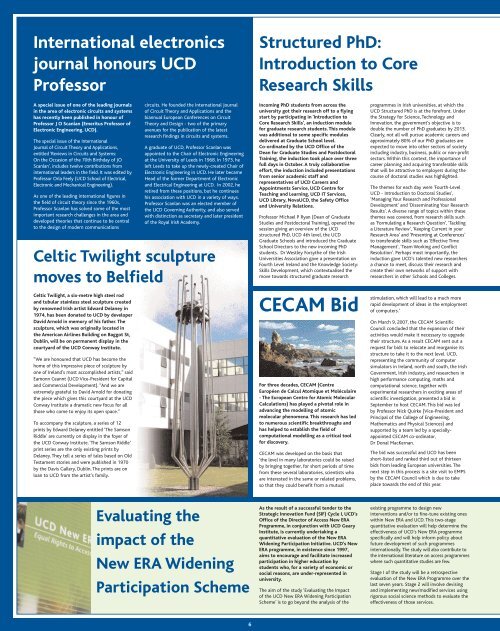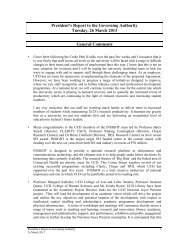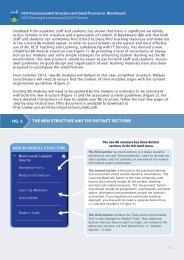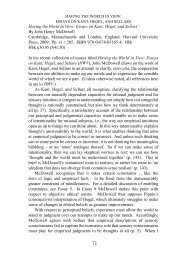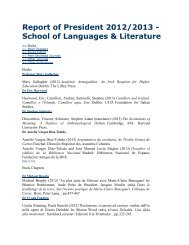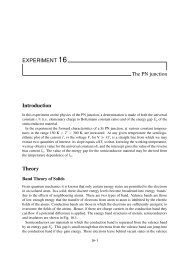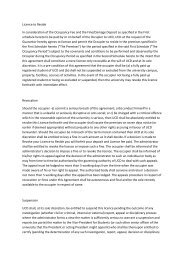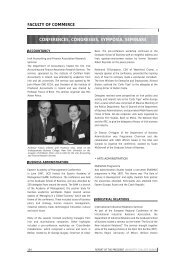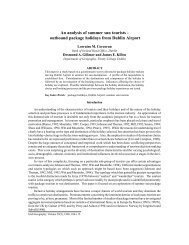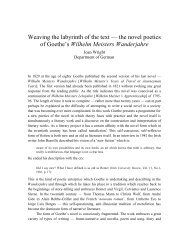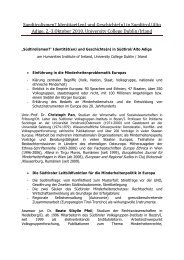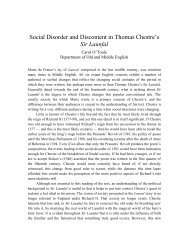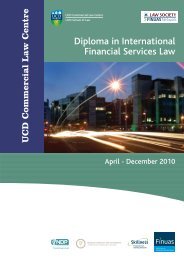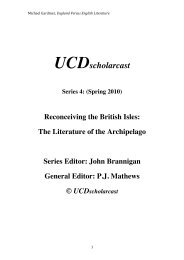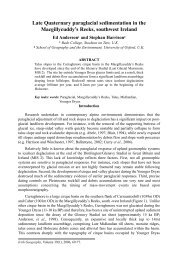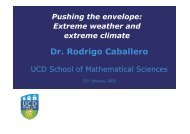Featured in this issue: - University College Dublin
Featured in this issue: - University College Dublin
Featured in this issue: - University College Dublin
Create successful ePaper yourself
Turn your PDF publications into a flip-book with our unique Google optimized e-Paper software.
International electronics<br />
journal honours UCD<br />
Professor<br />
A special <strong>issue</strong> of one of the lead<strong>in</strong>g journals<br />
<strong>in</strong> the area of electronic circuits and systems<br />
has recently been published <strong>in</strong> honour of<br />
Professor J O Scanlan (Emeritus Professor of<br />
Electronic Eng<strong>in</strong>eer<strong>in</strong>g, UCD).<br />
The special <strong>issue</strong> of the International<br />
Journal of Circuit Theory and Applications,<br />
entitled ‘Reviews <strong>in</strong> Circuits and Systems:<br />
On the Occasion of the 70th Birthday of JO<br />
Scanlan’, <strong>in</strong>cludes twelve contributions from<br />
<strong>in</strong>ternational leaders <strong>in</strong> the field. It was edited by<br />
Professor Orla Feely (UCD School of Electrical,<br />
Electronic and Mechanical Eng<strong>in</strong>eer<strong>in</strong>g).<br />
As one of the lead<strong>in</strong>g <strong>in</strong>ternational figures <strong>in</strong><br />
the field of circuit theory s<strong>in</strong>ce the 1960s,<br />
Professor Scanlan has solved some of the most<br />
important research challenges <strong>in</strong> the area and<br />
developed theories that cont<strong>in</strong>ue to be central<br />
to the design of modern communications<br />
circuits. He founded the International Journal<br />
of Circuit Theory and Applications and the<br />
biannual European Conferences on Circuit<br />
Theory and Design - two of the primary<br />
avenues for the publication of the latest<br />
research f<strong>in</strong>d<strong>in</strong>gs <strong>in</strong> circuits and systems.<br />
A graduate of UCD, Professor Scanlan was<br />
appo<strong>in</strong>ted to the Chair of Electronic Eng<strong>in</strong>eer<strong>in</strong>g<br />
at the <strong>University</strong> of Leeds <strong>in</strong> 1968. In 1973, he<br />
left Leeds to take up the newly-created Chair of<br />
Electronic Eng<strong>in</strong>eer<strong>in</strong>g <strong>in</strong> UCD. He later became<br />
Head of the former Department of Electronic<br />
and Electrical Eng<strong>in</strong>eer<strong>in</strong>g at UCD. In 2002, he<br />
retired from these positions, but he cont<strong>in</strong>ues<br />
his association with UCD <strong>in</strong> a variety of ways.<br />
Professor Scanlan was an elected member of<br />
the UCD Govern<strong>in</strong>g Authority, and also served<br />
with dist<strong>in</strong>ction as secretary and later president<br />
of the Royal Irish Academy.<br />
Celtic Twilight sculpture<br />
moves to Belfield<br />
Celtic Twilight, a six-metre high steel rod<br />
and tubular sta<strong>in</strong>less steel sculpture created<br />
by renowned Irish artist Edward Delaney <strong>in</strong><br />
1974, has been donated to UCD by developer<br />
David Arnold <strong>in</strong> memory of his father. The<br />
sculpture, which was orig<strong>in</strong>ally located <strong>in</strong><br />
the American Airl<strong>in</strong>es Build<strong>in</strong>g on Baggot St,<br />
Dubl<strong>in</strong>, will be on permanent display <strong>in</strong> the<br />
courtyard of the UCD Conway Institute.<br />
“We are honoured that UCD has become the<br />
home of <strong>this</strong> impressive piece of sculpture by<br />
one of Ireland’s most accomplished artists,” said<br />
Eamonn Ceannt (UCD Vice-President for Capital<br />
and Commercial Development). “And we are<br />
extremely grateful to David Arnold for donat<strong>in</strong>g<br />
the piece which gives <strong>this</strong> courtyard at the UCD<br />
Conway Institute a dramatic new focus for all<br />
those who come to enjoy its open space.”<br />
To accompany the sculpture, a series of 12<br />
pr<strong>in</strong>ts by Edward Delaney entitled ‘The Samson<br />
Riddle’ are currently on display <strong>in</strong> the foyer of<br />
the UCD Conway Institute. ‘The Samson Riddle’<br />
pr<strong>in</strong>t series are the only exist<strong>in</strong>g pr<strong>in</strong>ts by<br />
Delaney. They tell a series of tales based on Old<br />
Testament stories and were published <strong>in</strong> 1970<br />
by the Davis Gallery, Dubl<strong>in</strong>. The pr<strong>in</strong>ts are on<br />
loan to UCD from the artist’s family.<br />
Evaluat<strong>in</strong>g the<br />
impact of the<br />
New ERA Widen<strong>in</strong>g<br />
Participation Scheme<br />
6<br />
Structured PhD:<br />
Introduction to Core<br />
Research Skills<br />
Incom<strong>in</strong>g PhD students from across the<br />
university got their research off to a fly<strong>in</strong>g<br />
start by participat<strong>in</strong>g <strong>in</strong> ‘Introduction to<br />
Core Research Skills’, an <strong>in</strong>duction module<br />
for graduate research students. This module<br />
was additional to some specific modules<br />
delivered at Graduate School level.<br />
Co-ord<strong>in</strong>ated by the UCD Office of the<br />
Dean for Graduate Studies and Postdoctoral<br />
Tra<strong>in</strong><strong>in</strong>g, the <strong>in</strong>duction took place over three<br />
full days <strong>in</strong> October. A truly collaborative<br />
effort, the <strong>in</strong>duction <strong>in</strong>cluded presentations<br />
from senior academic staff and<br />
representatives of UCD Careers and<br />
Appo<strong>in</strong>tments Service, UCD Centre for<br />
Teach<strong>in</strong>g and Learn<strong>in</strong>g, UCD IT Services,<br />
UCD Library, NovaUCD, the Safety Office<br />
and <strong>University</strong> Relations.<br />
Professor Michael P Ryan (Dean of Graduate<br />
Studies and Postdoctoral Tra<strong>in</strong><strong>in</strong>g), opened the<br />
session giv<strong>in</strong>g an overview of the UCD<br />
structured PhD, UCD 4th level, the UCD<br />
Graduate Schools and <strong>in</strong>troduced the Graduate<br />
School Directors to the new <strong>in</strong>com<strong>in</strong>g PhD<br />
students. Dr Westley Forsythe of the Irish<br />
Universities Association gave a presentation on<br />
Fourth Level Ireland and the Knowledge Society:<br />
Skills Development, which contextualised the<br />
move towards structured graduate research<br />
CECAM Bid<br />
For three decades, CECAM (Centre<br />
Européen de Calcul Atomique et Moléculaire<br />
- The European Centre for Atomic Molecular<br />
Calculations) has played a pivotal role <strong>in</strong><br />
advanc<strong>in</strong>g the modell<strong>in</strong>g of atomic<br />
molecular phenomena. This research has led<br />
to numerous scientific breakthroughs and<br />
has helped to establish the field of<br />
computational modell<strong>in</strong>g as a critical tool<br />
for discovery.<br />
CECAM was developed on the basis that<br />
‘the level <strong>in</strong> many laboratories could be raised<br />
by br<strong>in</strong>g<strong>in</strong>g together, for short periods of time<br />
from these several laboratories, scientists who<br />
are <strong>in</strong>terested <strong>in</strong> the same or related problems,<br />
so that they could benefit from a mutual<br />
As the result of a successful tender to the<br />
Strategic Innovation Fund (SIF) Cycle I, UCD’s<br />
Office of the Director of Access New ERA<br />
Programme, <strong>in</strong> conjunction with UCD Geary<br />
Institute, is currently undertak<strong>in</strong>g a<br />
quantitative evaluation of the New ERA<br />
Widen<strong>in</strong>g Participation Initiative. UCD’s New<br />
ERA programme, <strong>in</strong> existence s<strong>in</strong>ce 1997,<br />
aims to encourage and facilitate <strong>in</strong>creased<br />
participation <strong>in</strong> higher education by<br />
students who, for a variety of economic or<br />
social reasons, are under-represented <strong>in</strong><br />
university.<br />
The aim of the study ‘Evaluat<strong>in</strong>g the Impact<br />
of the UCD New ERA Widen<strong>in</strong>g Participation<br />
Scheme’ is to go beyond the analysis of the<br />
programmes <strong>in</strong> Irish universities, at which the<br />
UCD Structured PhD is at the forefront. Under<br />
the Strategy for Science, Technology and<br />
Innovation, the government's objective is to<br />
double the number of PhD graduates by 2013.<br />
Clearly, not all will pursue academic careers and<br />
approximately 80% of our PhD graduates are<br />
expected to move <strong>in</strong>to other sectors of society<br />
<strong>in</strong>clud<strong>in</strong>g <strong>in</strong>dustry, bus<strong>in</strong>ess, public or non-profit<br />
sectors. With<strong>in</strong> <strong>this</strong> context, the importance of<br />
career plann<strong>in</strong>g and acquir<strong>in</strong>g transferable skills<br />
that will be attractive to employers dur<strong>in</strong>g the<br />
course of doctoral studies was highlighted.<br />
The themes for each day were ‘Fourth-Level<br />
UCD - Introduction to Doctoral Studies’,<br />
‘Manag<strong>in</strong>g Your Research and Professional<br />
Development’ and ‘Dissem<strong>in</strong>at<strong>in</strong>g Your Research<br />
Results’. A diverse range of topics with<strong>in</strong> these<br />
themes was covered, from research skills such<br />
as ‘Formulat<strong>in</strong>g a Research Question’, ‘Tackl<strong>in</strong>g<br />
a Literature Review’, ‘Keep<strong>in</strong>g Current <strong>in</strong> your<br />
Research Area’ and ‘Present<strong>in</strong>g at Conferences’<br />
to transferable skills such as ‘Effective Time<br />
Management’, ‘Team Work<strong>in</strong>g and Conflict<br />
Resolution’. Perhaps most importantly, the<br />
<strong>in</strong>duction gave UCD’s talented new researchers<br />
a chance to meet, discuss their research and<br />
create their own networks of support with<br />
researchers <strong>in</strong> other Schools and <strong>College</strong>s.<br />
stimulation, which will lead to a much more<br />
rapid development of ideas <strong>in</strong> the employment<br />
of computers.’<br />
On March 9, 2007, the CECAM Scientific<br />
Council concluded that the expansion of their<br />
activities would make it necessary to upgrade<br />
their structure. As a result CECAM sent out a<br />
request for bids to relocate and reorganise its<br />
structure to take it to the next level. UCD,<br />
represent<strong>in</strong>g the community of computer<br />
simulators <strong>in</strong> Ireland, north and south, the Irish<br />
Government, Irish <strong>in</strong>dustry, and researchers <strong>in</strong><br />
high performance comput<strong>in</strong>g, maths and<br />
computational science, together with<br />
experimental researchers <strong>in</strong> excit<strong>in</strong>g areas of<br />
scientific <strong>in</strong>vestigation, presented a bid <strong>in</strong><br />
September to host CECAM. This bid was led<br />
by Professor Nick Quirke (Vice-President and<br />
Pr<strong>in</strong>cipal of the <strong>College</strong> of Eng<strong>in</strong>eer<strong>in</strong>g,<br />
Mathematics and Physical Sciences) and<br />
supported by a team led by a speciallyappo<strong>in</strong>ted<br />
CECAM co-ord<strong>in</strong>ator,<br />
Dr Donal MacKernan.<br />
The bid was successful and UCD has been<br />
short-listed and ranked third out of thirteen<br />
bids from lead<strong>in</strong>g European universities. The<br />
next step <strong>in</strong> <strong>this</strong> process is a site visit to EMPS<br />
by the CECAM Council which is due to take<br />
place towards the end of <strong>this</strong> year.<br />
exist<strong>in</strong>g programme to design new<br />
<strong>in</strong>terventions and/or to f<strong>in</strong>e-tune exist<strong>in</strong>g ones<br />
with<strong>in</strong> New ERA and UCD. This two-stage<br />
quantitative evaluation will help determ<strong>in</strong>e the<br />
effectiveness of UCD’s New ERA programme<br />
specifically and will help <strong>in</strong>form policy about<br />
future development of such programmes<br />
<strong>in</strong>ternationally. The study will also contribute to<br />
the <strong>in</strong>ternational literature on access programmes<br />
where such quantitative studies are few.<br />
Stage I of the study will be a retrospective<br />
evaluation of the New ERA Programme over the<br />
last seven years. Stage 2 will <strong>in</strong>volve devis<strong>in</strong>g<br />
and implement<strong>in</strong>g new/modified services us<strong>in</strong>g<br />
rigorous social science methods to evaluate the<br />
effectiveness of those services.


